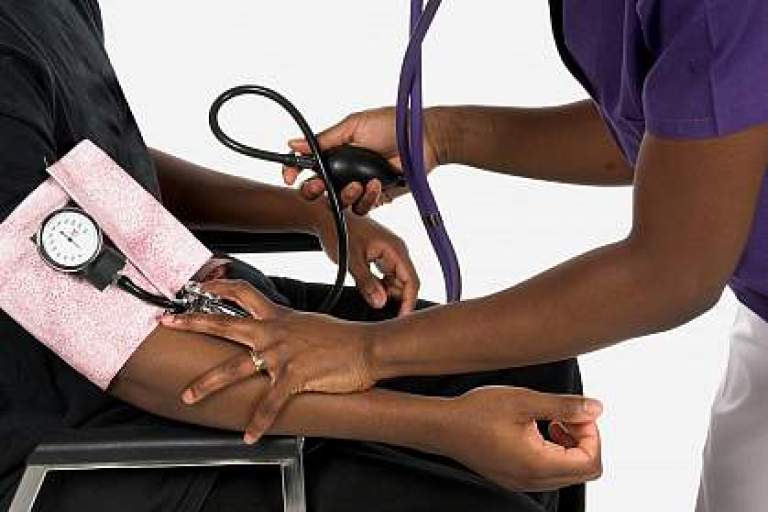
June 28, 2022
Hypertension: A Focus on African American Men
Hypertension is controllable, and the risks of heart disease, renal disease and stroke can be lessened.
By Laurie Brown-Croyts, PhD, NP
Hypertension is defined as blood pressure readings of 140/90 or greater measured on at least 2 occasions. African American men have a higher disease burden for hypertension. The Office of Minority Health indicates that 57% of AA men are hypertensive. Higher rates of stroke, heart disease, and kidney disease occur in AA male communities. African Americans are 30% more likely to die of heart disease as compared to other groups. To decrease the disease burden, a combined approach is needed that relies on best practices for lifestyle adjustment, health care management and systemic public health measures.
The control of hypertension must begin with lifestyle adjustment. Clients must be actively involved in lifestyle changes including regular exercise, limited alcohol consumption, smoking cessation, heart healthy eating plans and restful sleeping. Stress reduction should be included in a healthy lifestyle plan. These are lofty ideals, but they are attainable, especially if the person can be engaged in respectful and compassionate patient-centered care.
Hypertension control should also involve partnerships with the health care system. Following up with a consistent medical provider is most beneficial. This allows for blood pressure monitoring, regular laboratory work, and preventative health screenings. Medication to control blood pressure are often necessary. By partnering with their healthcare provider, patients can have open conversations about their willingness to take medication, the cost, side effects, adverse effects of any chosen medications.
Lastly, factors beyond the patient’s and health care provider’s direct control play a role in uncontrolled hypertension. The social determinants of health impact the severity and control of hypertension. Hypertension and poor health outcomes are worsened by negative social determinants of health which include: stressful family life, difficult work situations, lack of adequate health insurance, financial stressors of poverty, unsafe neighborhoods, pollution, poor access to nutritious foods, disinvestment in poor communities and many others. Underrepresented minority groups are more significantly impacted by these factors. While these challenges are formidable, participation in social change can have an impact.
Hypertension is controllable, and the risks of heart disease, renal disease and stroke can be lessened with effective partnerships between patients, caregivers, and communities.
References:
What is High Blood pressure? American Heart Association web page:
https:cpr.heart.org/en/health-topics/high-bloodpressure/the-facts-about-high-blood-pressure/what-is-high-blood-pressure
Racial disparities in hypertension prevalence and management: A crisis control? Anum Saeed MD, Dave L. Dixon Pharm D. and Eugene Yang MD April 6, 2020. American College of Cardiology
https://www.acc.org/latest-in-cardiology/articles/2020/04/06/08/53/racial-disparities-in-hypertension-prevalence-and-management
Department of Health and Human Services Office of Minority Health Web page:
https://www.minorityhealth.hhs.gov/omh/browse.aspx?lvl=4&lvlid=19
American Heart Association Life’s simple 7 Webpage:
https://www.heart.org/en/professional/workplace-health/lifes-simple-7
Differences in Hypertension medication prescribing for Black Americans and their association with hypertension outcomes. Hunter Holt, Ginny Gildengorin, Leah Karliner. The Journal of the American Board of Family Medicine. January 2022, 35(1) 26-34
https://www.jabfm.org/content/35/1/26.full
Multiple social vulnerabilities to health disparities and hypertension and death in the REGARDS study. Jordan King, Laura Pinheiro, Joanna Bryan Ringel. Hypertension volume 79, Issue 1, January 2022 pages 196-206.
https://www.ahajournals.org/doi/10.1161/HYPERTENSIONAHA.120.15196